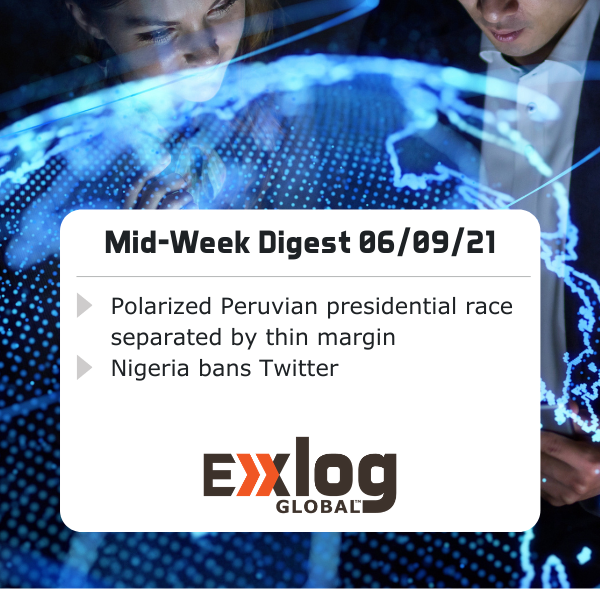Peru: Close presidential election race prompts fears of political upheaval
Political tensions are growing in Peru as tight margins and accusations of voter fraud in the ongoing presidential election seem highly likely to send the tally into a recount. The narrow vote margin between right-wing candidate Keiko Fujimori and socialist opponent Pedro Castillo has fluctuated immensely over the past few days and the candidates are currently only separated by a margin of 0.4% (~70-80,000 votes) with 99.8% of votes counted as of Jun. 9.
Castillo, a former schoolteacher and son of farmers, achieved surprising success thanks to his socialist platform resonating with rural voters. His strong showing sent the Peruvian stock market and sol currency into freefall after he gained a slight lead on Monday. Grounded in ideas of more state regulation and market controls, Castillo is proposing the creation of a new constitution and an overhaul of the current Peruvian economic model, by nationalizing the mining, gas, and oil industries. His rival, Fujimori—daughter of imprisoned former President Alberto Fujimori—symbolizes the opposite end of the political spectrum. She draws much of her support from anti-socialist, higher income Peruvians—primarily in the capital, Lima—due to her free-market approach. The polarization of the contest has prompted fears of political instability regardless of the election result because of the diverse demographics the candidates represent – the social tension has been amplified by recent accusations of fraud. After losing her early lead, Fujimori alleged Castillo had committed fraud citing widespread voter discrepancies; however, these claims remain unproven, and no evidence of fraud has been presented or found by international observers. Despite the lack of evidence, the fraud accusations have incited several competing protests outside the main election office in Lima – the demonstrations have remained peaceful thus far.
Though the preliminary count is expected to end on Wednesday, the approximately 300,000 votes that Fujimori has claimed are fraudulent will need to be recounted by an electoral jury, which will likely take days. Already tense from a tumultuous 2020 that saw deadly protests ousting two presidents in under a week, the result of the election could trigger political upheaval and unrest incendiary, especially if either candidate refuses to concede the final result.
Nigeria: Government bans Twitter use countrywide following platform’s censor of President Buhari
Civil unrest may increase in Nigeria in the near term following the country’s move to ban Twitter nationwide on Jun. 4. The ban was instituted following the platform’s deletion of a tweet made by President Muhammadu Buhari that violated Twitter’s rules for “abusive behavior;” the deletion occurred in conjunction with a 12-hour account suspension.
The tweet—which referenced the 1967-70 Nigerian Civil War over the former Biafra province—issued a thinly veiled threat of violence against the Indigenous People of Biafra (IPOB), who are accused by the government of inciting ongoing violence in the country’s southeast. Lai Mohammed, the Minister of Information and Culture, condemned Twitter on Jun. 3 for its deletion of the tweet, calling the action a double standard, and later announcing that the government was suspending the platform in Nigeria.
The Association of Licensed Telecommunication Operators of Nigeria (ALTON) confirmed that they were complying with a government directive to suspend access to Twitter as of Jun. 5 – the platform was inaccessible on most mobile carriers by the next day according to tests conducted by news outlets in Lagos and Abuja. To further solidify the ban, the government has ordered the licensing of all social media operations within the country and the prosecution anyone who violates its terms, allowing them greater authority to censor or restrict future social media usage. Contributing to the current dynamic, social media has long been a tool to organize demonstrations and disseminate information within the country and has been used to check Buhari’s government as witnessed in the October 2020 EndSARS anti-police brutality movement.
This recent ban follows a growing trend to limit the use of social media in Nigeria to repress free speech, evidenced by a 2019 law banning dissemination of false news over social media platforms. At the time of this publication, Buhari, Lai, and the official government’s twitter accounts were still active, though no new tweets have been posted since the ban. Prominent Nigerian opposition officials, Western governments, Amnesty International, and Human Rights Watch have all condemned the ban as a violation of the right of free speech, while some remaining active Twitter users—utilizing VPNs—have called for renewed protests through the circulation of several hashtags.


